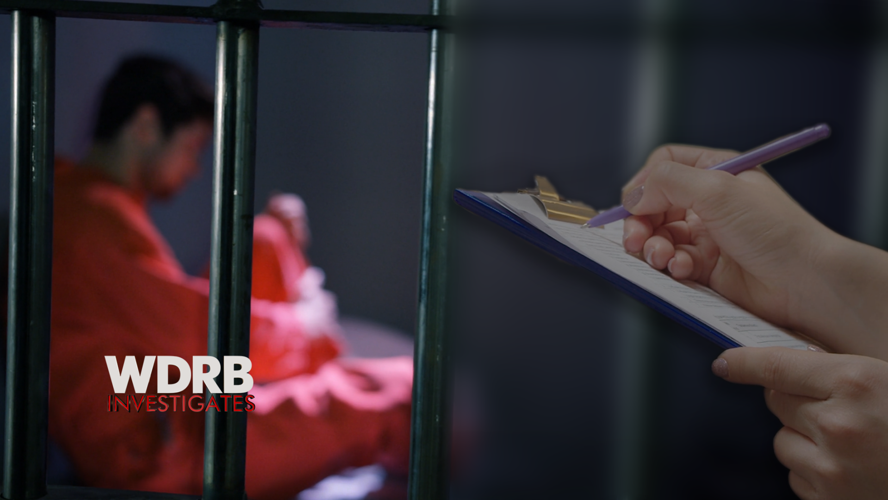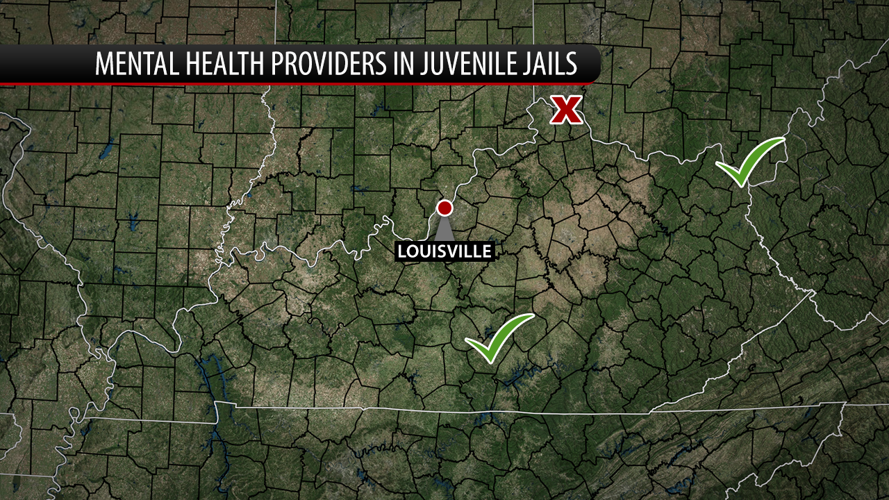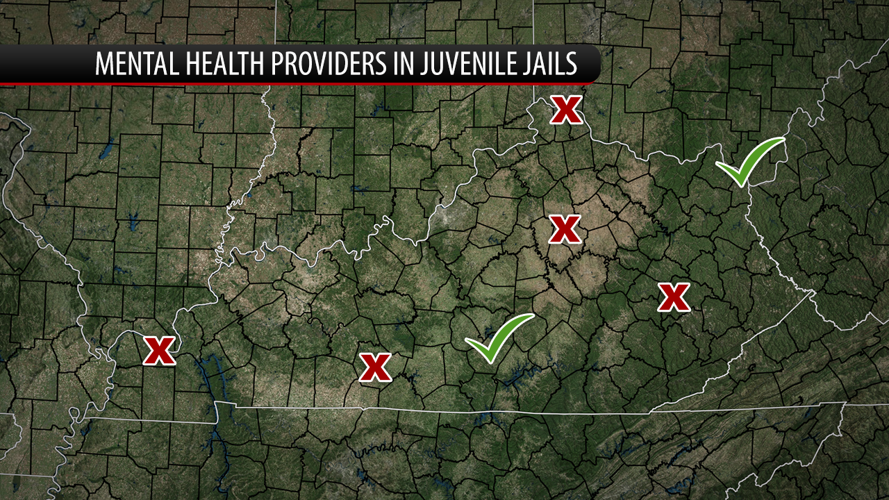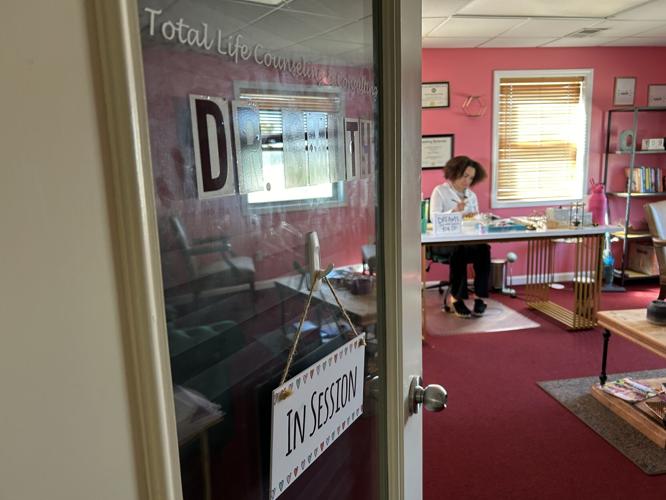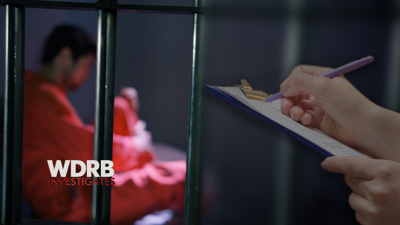LOUISVILLE, Ky. (WDRB) -- Most of Kentucky's juvenile jails don't have access to regular therapists, the service that one Kentucky social worker said is the key to keeping kids out of jail.
"I think it's a huge crisis," said Chauweda Smith, a licensed clinical social worker. "I think, a lot of times, these kids are forgotten about once they are incarcerated."
Smith, a west Louisville native, dedicated her life to bettering the lives of young people.
"Growing up, there wasn't such a thing as going to therapy," she said. "I've never heard anyone in my neighborhood talk about therapy. So for me to offer that to youth was different, and I can give them hope for their future and to work on their mental health as well, because I never got the opportunity to do that."
Smith previously served as the mental health clinician for Jefferson County Youth Detention Center before it abruptly closed in December 2019.
To help change bad behavior, Smith said it starts with repairing self-esteem and addressing past trauma.
"We're talking about years of trauma," she said. "Some of these kids have had issues with violence. They saw people get murdered. So when you think about that in the impact on a child, you're talking about significant treatment that they need."
But to do so, access and consistency are dire to achieve success, the kind of thing that isn't easy when a jail doesn't have a mental health professional on staff.
Smith said when she found out Louisville's juvenile jail was to be shut down in 2019 she knew it effectively stopped the progress for the kids inside.
"It was heartbreaking for me. I wasn't ready for that," she said. "I wanted a longevity working with them. Therapy is an ongoing process — beginning middle and end."
In a request to Kentucky's Department of Juvenile Justice, WDRB News uncovered only two of the seven active juvenile jails, known as youth detention centers, had qualified mental health professionals (QMHPs) on staff, one of which was staffed with two part-time QMHPs.
Juvenile Detention Centers with a QMHP:
- Boyd Regional Juvenile Detention Center
- Adair Regional Youth Detention Center (shares two QMHPs part-time)

Check marks signify a qualified mental health provider is on staff to juveniles in each of the located juvenile jails.
Juvenile Detention Centers without a QMHP:
- Breathitt Regional Juvenile Detention Center
- Campbell Regional Juvenile Detention Center
- Fayette Regional Juvenile Detention Center
- McCracken Regional Juvenile Detention Center
- Warren Regional Juvenile Detention Center
In a statement, a spokesperson for the Department of Juvenile Justice said the agency "continues to actively recruit and fulfill the open positions through the state’s personnel website and the contract agency, Amergis."
A group of stakeholders and lawmakers form the Juvenile Justice Oversight Council, which has focused on improving the state's juvenile justice system. At the council's Oct. 4 meeting, Sen. Whitney Westerfield, R-Fruit Hill, pressed the DJJ Commissioner on its mental health staffing issues.
"I think (mental health) is more important than barbed wire and walls," Westerfield said.
Kentucky DJJ Commissioner Randy White said there are several factors at play, including location of the facilities, pay and nature of the work.

Chauweda Smith, a licensed clinical social worker in Louisville. (WDRB Photo)
"I don't want to dwell on pay as the only thing, but it would certainly help," White said. "We can't pay our way out of vacancies."
The DJJ said when a facility is without a QMHP, one of the three regional psychologists can fulfill the functions in addition to help from the DJJ's Mental Health Director.
Westerfield pressed White if the current way provides enough coverage.
"We would always seek to have more coverage," White said. "We'd like to have all facilities filled."
Smith said, for Louisville kids, the need for therapy while serving time in a juvenile jail is critical, considering there isn't a jail in Jefferson County.
"If they are not working on their mental health, and they're abandoned, you're gonna see a lot of recidivism," she said.
High-risk Louisville males are sent to Adair Regional Juvenile Detention Center, which currently has two part-time QMHPs. Low-risk Louisville males are sent to Campbell Regional Juvenile Detention Center, where they do not have a QMHP on staff.
All females across the state are housed Boyd Regional Juvenile Detention Center, which does have a QMHP on staff, according to DJJ.
"I hope that we can all come together and just continue to serve the community and these families and the youth," Smith said. "They really, really, really need us."
In addition to detention centers, the state also uses development centers, which are described by the DJJ as "small campus-type" environments. The majority of these facilities do have a QMHP on staff.

Check marks signify a qualified mental health provider is on staff to juveniles in each of the located juvenile jails.
Youth Development Centers without a QMHP:
- Lake Cumberland Youth Development Center
Youth Development Centers with a QMHP:
- Adair Youth Development Center *shares 2 QMHPs part-time
- Mayfield Youth Development Center
- Morehead Youth Development Center
- Northern Kentucky Youth Development Center
- Woodsbend Youth Development Center
Some have said a separate psychiatric hospital for youth could be a solution to help those with the most need for mental health care. It has been pitched in the legislature but didn't come to fruition in the 2024 session. Gov. Andy Beshear has also pushed for this type of facility.
"Juveniles with severe mental health needs should be in a facility employed by licensed medical staff and not in a detention center," Morgan Hall, a spokesperson for the DJJ, said in a statement. "The Governor's proposed funding for a facility remains a critical need of the department."

Most of Kentucky's juvenile jails don't have access to regular therapists, the service that one Kentucky social worker said it is the key to keeping kids out of jail.
Kentucky Juvenile Detention Coverage:
- DOJ hosts community meeting ahead of investigation into Kentucky's juvenile justice department
- DOJ will investigate conditions at Kentucky's troubled juvenile justice department
- 'This is progress' | Kentucky bill targets state's embattled juvenile justice program
- New report reveals problems with use of force, isolation in Kentucky juvenile jails
Copyright 2024 WDRB Media. All Rights Reserved.
